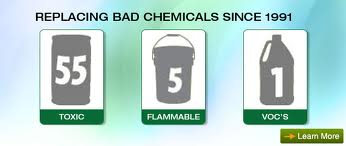For those companies that use cleaning and degreasing agents to rid your industrial parts of harmful particles and contaminants, when was the last time someone at your place of business looked into whether your current cleaner is made up of hazardous chemical components? In all likelihood, industrial organization that are using older model cleaning and degreasing solvents are using chemical agents that have been condemned as hazardous to the environment and a danger to people. Much of this has to do with a previous ignorance concerning how the chemical compounds in a solvent mesh with the environment, more specifically the air, the ozone, soil, and water sources. Thankfully, there are organizations such as Ecolink that employ scientists, environmental professionals, and other kinds of experts who have performed research and analysis on countless chemical agents to determine whether they produce a harmful component that endangers the environment and the people who come in to contact with, or are in close proximity to the chemical. Results have been quite astonishing and alarming, as many of the current cleaning solvents that have been in use for quite a log time pose serious threats to both people and the environment. Fortunately, eco conscious groups and agencies like Ecolink have found eco friendly, green alternative parts cleaning solutions that offer industrial businesses an opportunity to transition to an up to date non toxic solvent and degreaser.
Transitioning to a more current cleaner that has been created with non toxic chemical solvents that make for safer cleaning and degreasing is much easier than one may think. First, the cost of making the switch to a non toxic solvent is not expensive at all. In fact, eco friendly, green alternative cleaners and degreasers are not any more expensive than traditional cleaning agents, and in many cases, propose to be a less expensive alternative, providing industrial businesses the opportunity to go not only greener, but cheaper. In addition, many of the newer, safer cleaning and degreasing alternative provide methods of waste reduction through recycling processes, which is also a fantastic way for industrial businesses to reduce waste, and save money on cleanup costs. Most importantly, the second your industrial business finds out that it is using a hazardous and toxic cleaning and degreasing solvent, the very first subsequent action should be to find a safer chemical alternative. Learning that your industrial company has an opportunity to change its chemical solution to an eco friendly, green alternative that will no longer place people and the environment in harm’s way should be an immediate call to action, no matter how expensive or difficult the substitution may be. The fact that non toxic solvents exist, are not any more expensive, will save your business money in the long run, reduces waste, protects the environment, and does not affect people should be more than enough reason to replace your current cleaner.















